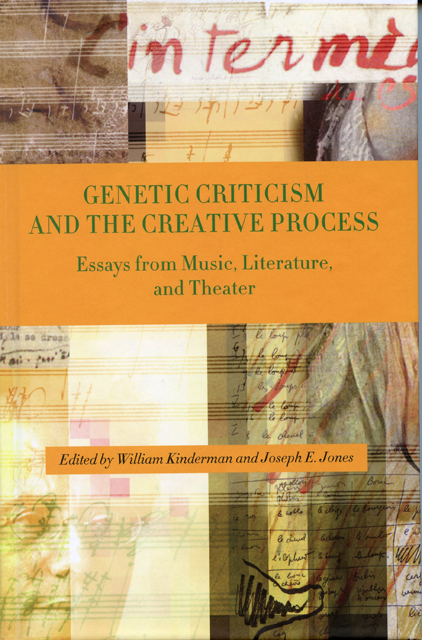Book contents
- Frontmatter
- Contents
- Acknowledgments
- Genetic Criticism and the Creative Process
- 1 Texts, Variants, and Variations: Evolving Contexts in Literature and Theater
- 2 Genetic Processes in Music: From Beethoven to Leroux
- 1 From Varieties of Genetic Experience to Radical Philology
- 2 Variant and Variation: Toward a Freudo-bathmologico-Bakhtino-Goodmanian Genetic Model?
- 3 The Genetic Record of a Voice: Variants in Barthes's Le Plaisir du texte
- 4 Can Genetic Criticism Be Applied to the Performing Arts?
- 5 “The hardy Laurel”: Beckett and Early Film Comedy
- 6 From Melodic Patterns to Themes: The Sketches for the Original Version of Beethoven's “Waldstein” Sonata, Op. 53
- 7 From Conceptual Image to Realization: Some Thoughts on Beethoven's Sketches
- 8 The Process within the Product: Exploratory Transitional Passages in Beethoven's Late Quartet Sketches
- 9 “They Only Give Rise to Misunderstandings”: Mahler's Sketches in Context
- 10 A Study of Richard Strauss's Creative Process: Der Rosenkavalier's “Presentation Scene” and “Schlußduett”
- 11 Genetic Criticism and Cognitive Anthropology: A Reconstruction of Philippe Leroux's Compositional Process for Voi(rex)
- Afterword
- Contributors
- Index
3 - The Genetic Record of a Voice: Variants in Barthes's Le Plaisir du texte
Published online by Cambridge University Press: 02 March 2023
- Frontmatter
- Contents
- Acknowledgments
- Genetic Criticism and the Creative Process
- 1 Texts, Variants, and Variations: Evolving Contexts in Literature and Theater
- 2 Genetic Processes in Music: From Beethoven to Leroux
- 1 From Varieties of Genetic Experience to Radical Philology
- 2 Variant and Variation: Toward a Freudo-bathmologico-Bakhtino-Goodmanian Genetic Model?
- 3 The Genetic Record of a Voice: Variants in Barthes's Le Plaisir du texte
- 4 Can Genetic Criticism Be Applied to the Performing Arts?
- 5 “The hardy Laurel”: Beckett and Early Film Comedy
- 6 From Melodic Patterns to Themes: The Sketches for the Original Version of Beethoven's “Waldstein” Sonata, Op. 53
- 7 From Conceptual Image to Realization: Some Thoughts on Beethoven's Sketches
- 8 The Process within the Product: Exploratory Transitional Passages in Beethoven's Late Quartet Sketches
- 9 “They Only Give Rise to Misunderstandings”: Mahler's Sketches in Context
- 10 A Study of Richard Strauss's Creative Process: Der Rosenkavalier's “Presentation Scene” and “Schlußduett”
- 11 Genetic Criticism and Cognitive Anthropology: A Reconstruction of Philippe Leroux's Compositional Process for Voi(rex)
- Afterword
- Contributors
- Index
Summary
Roland Barthes's manuscripts have been held at the Institut Mémoire de l’Édition Contemporaine, known as IMEC, since 1996. Before then, I was fortunate enough to be invited in 1990 by Barthes's half-brother, Michel Salzedo, to examine the manuscript of Le Plaisir du texte in the very apartment where Barthes had lived, rue Servandoni in the 6th arrondissement in Paris. What led me to this genetic line of inquiry was this: a portion of one manuscript page photographed on the cover of the “pocket” edition, in the Points series at the Editions du Seuil, included words not found in the corresponding passage in print. At my request, the publisher generously supplied a photocopy of the manuscript in 1989, and I conducted a systematic study of what Barthes called “writing by subtraction” in a 1995 article. “J’écris parce que je ne veux pas des mots que je trouve: par soustraction” (I write because I want nothing to do with the words I find—by subtraction), he wrote in Le Plaisir du texte, and page after manuscript page gave proof of this assertion. Le Plaisir du texte is the book that theorizes the practice of subtraction, which, unbeknownst to readers of the printed book, is the principal cause, along with intertextuality, of the remarkable density of this extremely short but often misunderstood book.
A second study of the manuscript yielded a contribution to the vexed question of the order of the fragments. As is well known, starting with his 1970 book Sade, Fourier, Loyola, Barthes wrote all his books in fragments that range in length from a few lines to a few pages. In manuscript, fragments are almost always one to a page (in this case, there are six that run longer), a form that allowed Barthes great freedom in constructing the book, so that the final, published text was always the product of a play of movement with the manuscript folios, including the combination of fragments into larger sections. In the case of Le Plaisir du texte, the manuscript reveals choices about the order of the fragments that only a genetic reading can discover; meanings change (and often the titles of the fragments) according to the position of the fragments and their relationships to each other.
- Type
- Chapter
- Information
- Genetic Criticism and the Creative ProcessEssays from Music, Literature, and Theater, pp. 51 - 67Publisher: Boydell & BrewerPrint publication year: 2009



